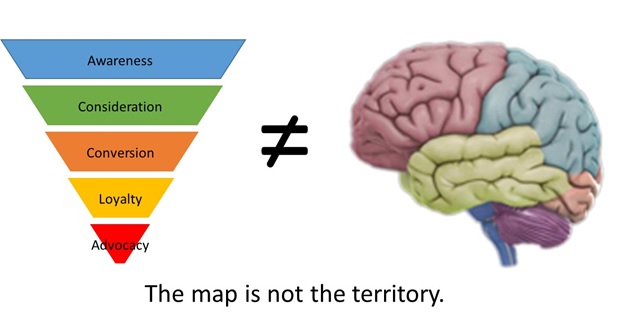Don’t Confuse Your Funnel With Reality
May 28, 2014 Industry News, Marketing, Marketing And Advertising Analytics, Optimization, Search Analytics, Web Analytics
Models are supposed to make it easier to see useful patterns, but if you devote enough time to using them you can forget you are looking at a simplified view of reality and not reality itself. The marketing funnel is a great example of how this can happen.
When you are trying get a holistic view of your marketing plan, it is often helpful to segment the audience according to where they are on the path from never having heard of your brand to the end state of buying your product. It can make things clearer. Let’s say you have done some analysis of the buying process for your product and you have found that people move through it like this:
Let’s further say your numbers say that the conversion rates for a given month look like this:
The numbers indicate that once someone is researching your product you have a really good chance of making them a customer. Depending on your cost per acquisition and the value of your product, you’d probably want to step up your efforts to drive them to your site.
Would that still be your conclusion if you knew that:
The list of complicating factors could go on and on. The point is, you are looking at a model. Don’t forget there is a particularly complicated reality behind any marketing model: the mind of the buyer.
Lying Is Not Good Marketing
May 13, 2014 Industry News, Integrity and Marketing, Marketing, Marketing And Advertising Analytics
The future of your brand – whether your marketing is online, offline, DR, branding, whatever – the survival of it depends on one key thing.
It is not big data or better metrics. It is not futuristic ad formats. It is not social media.
It is resisting the temptation to mislead people to make money. In other words, not lying.
The Ad Business press has been recommending something like this, but using the word “authenticity”. This sounds too much like Stephen Colbert’s “truthiness”, or like George Burns when he said, “Sincerity – if you can fake that, you’ve got it made.”
The fact of the matter is that, while the absolute truth is not determinable in any way that satisfies philosophers, sane people know when they are lying. That is why they work so hard at legitimizing their lies, substituting the idea of the legally permissible for the facts as they know them to be. In marketing, that ultimately results in: bad customer experiences, consumer cynicism, dissatisfied customers, jaded employees, and bad long-term business results. Lying is a short-term ploy to boost sales that ultimately kills sales by debasing your brand.
What alternatives are there to misleading offers, irrelevant images, and fast-talking copy?
How about:
1. What you could do to make your product better.
2. What you could do to make your customer experience better.
3. What you could do make your value proposition unbeatable.
4. What you could do to build customer loyalty.

